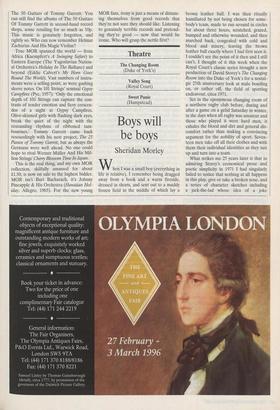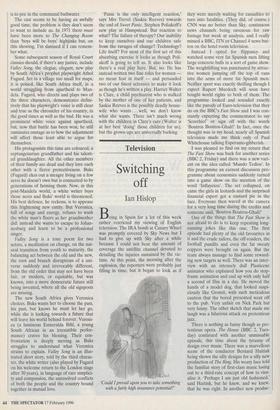Theatre
The Changing Room (Duke of York's) Valley Song (Royal Court) Sweet Panic (Hampstead)
Boys will be boys
Sheridan Morley
When I was a small boy (everything in life is relative), I remember being dragged away from a book and a warm fireside, dressed in shorts, and sent out to a muddy frozen field in the middle of which lay a brown leather ball. I was then ritually humiliated by not being chosen for some- body's team, made to run around in circles for about three hours, scratched, grazed, bumped and otherwise wounded, and then marched back, congealed with cold and blood and misery, leaving the brown leather ball exactly where I had first seen it. I couldn't see the point of it then and I still can't. I thought of it this week when the Royal Court's classic series brought a new production of David Storey's The Changing Room into the Duke of York's for a nostal- gic 25th anniversary look at male bonding on, or rather off, the field of sporting endeavour, circa 1971.
Set in the eponymous changing room of a northern rugby club before, during and after a game on a gelid Saturday in winter, in the days when all rugby was amateur and those who played it were hard men, it exhales the blood and dirt and general dis- comfort rather than making a convincing argument for the nobility of sport. Seven- teen men take off all their clothes and with them their individual identities as they suit up and turn into a team.
What strikes me 25 years later is that in admiring Storey's economical prose and poetic simplicity in 1971 I had singularly failed to notice that nothing at all happens in this play, give or take a broken nose, and a series of character sketches including a jack-the-lad whose idea of a joke is to pee in the communal bathwater.
The cast seems to be having an awfully good time, the problem is they don't seem to want to include us. In 1971 there must have been more to The Changing Room than 'boys will be boys' highjinks but, on this showing, I'm damned if I can remem- ber what.
Some subsequent season of Royal Court classics should, if there's any justice, include Valley Song the elegiac, elegant, new play by South Africa's prophet playwright Athol Fugard. Set in a village too small for maps, it is poised, like South Africa itself, in a world struggling from apartheid to Man- dela. Fugard, who directs and plays two of the three characters, demonstrates defini- tively that his playwright's voice is still clear and true as the chronicler of his country, in the good times as well as the bad. He was a prominent white voice against apartheid, but, now that battle has been won, he still ruminates onstage as to how the adjustment will affect those least able to argue for themselves.
His protagonists this time are coloured, a septuagenarian grandfather and his talent- ed granddaughter. All the other members of their family are dead and they love each other with a fierce protectiveness. Buks (Fugard) ekes out a meagre living on a few acres he doesn't own but is connected to by generations of farming them. Now, in this post-Mandela world, a white writer buys those acres and Buks' world is threatened. His best defence, he reckons, is to appease this frightening new entity. But Veronica, full of songs and energy, refuses to wash the white man's floors as her grandmother did; instead she wants to escape to Johan- nesburg and learn to be a professional singer.
Valley Song is a tone poem for two actors, a meditation on change, on the nat- ural transition from youth to maturity, the balancing act between the old and the new, the root and branch disruptions of a uni- verse suddenly and irrevocably different, from the old order that may not have been fair, or modern, or equitable, but was known, into a more democratic future still being invented, where all the old signposts are missing.
The new South Africa gives Veronica choices. Buks wants her to choose the past, his past, but knows he must let her go, while she is looking towards a future that will leave his world behind forever. Veroni- ca (a luminous Esmeralda Bihl, a young South African in an irresistible perfor- mance) craves his blessing. Their con- frontation is deeply moving as Buks struggles to understand what Veronica strains to explain. Valley Song is an illus- trated short story, told by the third charac- ter, the white writer (also played by Fugard on his welcome return to the London stage after 30 years), in language of rare simplici- ty and compassion, the unresolved conflicts of both the people and the country bound together in mutual love. 'Panic is the only intelligent reaction,' says Mrs Trevel (Saskia Reeves) towards the end of Sweet Panic, Stephen Poliakoff s new play at Hampstead. But reaction to what? The failure of therapy? Our inability to keep ourselves and our children safe from the ravages of change? Technology? Life itself? For most of the first act of this absorbing exercise it looks as though Poli- akoff is going to tell us. It also looks like there's a real play here. But, no. He has instead written two fine roles for women — no mean feat in itself — and persuaded two of our finest actresses to make it look as though he's written a play. Harriet Walter is Clare, a child psychiatrist who is stalked by the mother of one of her patients, and Saskia Reeves is the possibly deadly house- wife who wants ... well, we don't know what she wants. There isn't much wrong with the children in Clare's care (Walter is at her best 'doing' those children for us), but the grown-ups are universally barking.



























































 Previous page
Previous page